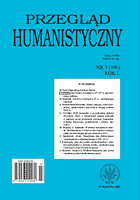Trzy dyskursy o dzieciństwie i przeszłości w poezji Tadeusza Różewicza
Three discourses of childhood and past in the poetry of Tadeusz Różewicz
Author(s): Robert MielhorskiSubject(s): Cultural Essay, Political Essay, Societal Essay
Published by: Wydawnictwa Uniwersytetu Warszawskiego
Keywords: Różewicz; poezja
Summary/Abstract: The basis of this article is the thesis regarding discoursive nature of the poetry of Tadeusz Różewicz. The author explains the meaning of the notion of “discourse”, referring in particular to its two characteristics: reflexive directedness of the (poet’s) communications and its argumentative order. The essay – based on this methodological assumption and relating to the problems of the past, memory and childhood in Różewicz’s lyric, distinguishes between the following three kinds of discourses: the existentially-cultural and metaphysical, the naive and return-to-innocence and autobiographical and generational. The problems of the past-memory-childhood have a universal function in Różewicz’s writing: 1) they show the border of two cultural formations and the time of annihilation of the former vision of the World, 2) they illustrate the moment of initiation (including the door motif: into sacrum, ethic and erotic), 3) the create the image of regression into the sphere of naiveté and innocence (including the observation of reality beneath the knowledge about the world and by referring to childish stylistic) and its relationship to everything contemporary, 4) they explain the correspondences between the announcements and the mature things (including the old age) based on generational and personal (autobiographical) references to poetry. Staying within the delineated circle of works Różewicz asks the question regarding the role player by the past in the present, takes up the issues of religion and faith, looks for a biographical and generational perspective in viewing his own as well as his generation’s way and fate. The experience of childhood and memory becomes the starting point of reflection.
Journal: Przegląd Humanistyczny
- Issue Year: 434/2011
- Issue No: 03
- Page Range: 45 - 58
- Page Count: 14
- Language: Polish
- Content File-PDF

